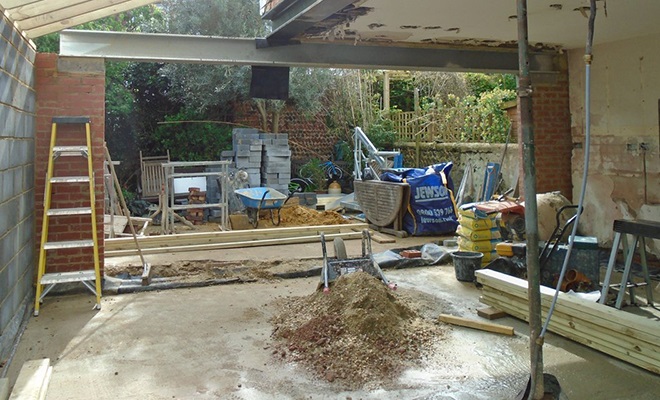Tradesmen Costs
Last updated 23rd March, 2025
Want to know a tradesman's hourly rate?
If you've been wondering what the going rate is for a certain trade you've come to the right place! This tradesman price guide covers everything. We explore a range of trades to save you from having to trawl the internet. So if you're looking for an electrician's hourly rate or a plumber's day rate then look no further!
Keep reading for a complete breakdown!

Table of Contents
- How much does a tradesman cost?
- Cost factors of a tradesperson’s pay rate
- What is a day rate?
- Average UK tradesmen's day rates
- What is an hourly rate?
- Tradesman cost per hour
- What’s included in a tradesperson day & hourly rate?
- Average tradesmen salaries
- What can affect a tradesperson's salary?
- FAQs
- Sources
How Much Does a Tradesman Cost?
The below table breaks down the average daily and hourly rates for tradesman in the UK. The cost is dependent on many factors including lcoation, scale of work, accessibility etc.
For small jobs you may be charged the hourly rate while jobs that are longer term you will be charged per day. The way your tradesman chooses to charge for the work is completely dependent on them. We recommend you communicate throughout the job and don't agree to a price until you are happy.
| Trade | Hourly Rate | Day rate |
|---|---|---|
| Plumber | £40 - £60 | £150 - £270 |
| Carpenter | £8 - £20 | £130 - £170 |
| Painter and decorator | £8 - £15 | £120 - £180 |
| Electrician | £30 - £50 | £150 - £280 |
| Plasterer | £10 - £15 | £130 - £170 |
| Kitchen Fitter | £10 - £20 | £125 - £160 |
| Bricklayer | £8 - £15 | £120 - £170 |
| Labourer | £8 - £15 | £100 - £160 |
| Scaffolder | £12 - £22 | £120 - £160 |
| Tiler | £12 - £20 | £140 - £200 |
| Builder | £9 - £35 | £150 - £280 |
| Gardener | £10 - £30 | £90 - £160 |
| Landscaper | £20 - £40 | £110 - £180 |
| Roofer | £10 - £30 | £150 - £220 |
| Window Fitter | £10 - £20 | £120 - £180 |
| Window Cleaner | £8 - £15 | £90 - £150 |
Cost Factors of a Tradesperson’s Pay Rate
There are a number of things that could affect tradesmen rates of pay. The following are the most common cost factors among tradespeople’s daily and hourly pay rates.
Qualifications
It goes without saying that you can expect to pay more for a more qualified tradesman than one who has fewer qualifications.
Tradesmen who are qualified will have passed some form of examination or the official completion of a type of course that is especially relevant and focuses on the teachings of that particular trade. This often includes completion of a BTEC Diploma, an NVQ, or a bachelor’s degree in a particular area of trade.
Experience
Another obvious point that may affect the pricing that your tradesperson charges is their experience. A more experienced tradesperson can charge more for their work.

More experienced tradesmen can often show proof of their good work through recommendations, reviews, and testimonials from previous clients. For trades such as carpentry and decorating, they may even be able to show you pictures of previous work so you can see the type of experienced work you are paying more for.
Location
Your location in the UK can affect the cost that you can expect to pay your tradesperson for work at both a daily and hourly rate.
On average, if you are based in London, you can expect to pay around £30 to £80 more on day rates and around £2 to £5 more on hourly rates than if you live in the Northern region of the UK.
For example, a plumber in London will charge a higher rate (£220 to £280 per day) than a plumber in Manchester (£150 to £200 per day), and a London electrician will be more expensive than a Cardiff electrician etc.
Check out the tables below to get an idea of different tradesmen's prices depending on location within the UK.
| Trade | HOURLY RATE & DAY RATE |
|---|---|
| London Plumber | £42 - £65 per hour / £180 - £280 per day |
| London Carpenter | £20 - £25 per hour / £160 - £250 per day |
| London Electrician | £32 - £55 per hour / £160 - £250 per day |
| London Plasterer | £15 - £25 per hour / £160 - £250 per day |
| Manchester Plumber | £40 - £60 per hour / £150 - £200 per day |
| Manchester Carpenter | £15 - £20 per hour / £150 - £280 per day |
| Manchester Electrician | £30 - £50 per hour / £150 - £280 per day |
| Manchester Plasterer | £10 - £15 per hour / £130 - £170 per day |
| Birmingham Plumber | £38 - £58 per hour / £140 - £190 per day |
| Birmingham Carpenter | £15 - £18 per hour / £150 - £250 per day |
| Birmingham Electrician | £28 - £48 per hour / £150 - £250 per day |
| Birmingham Plasterer | £10 - £15 per hour / £120 - £160 per day |
| Cardiff Plumber | £25 - £55 per hour / £135 - £180 per day |
| Cardiff Carpenter | £10 - £15 per hour / £130 - £240 per day |
| Cardiff Electrician | £25 - £45 per hour / £140 - £260 per day |
| Cardiff Plasterer | £10 - £15 per hour / £120 - £160 per day |
Company or Self-Employed
Whether you choose to have your work done by a company or a self-employed contractor can affect the pricing. Large national companies will usually charge more than a self-employed professional.
This is because companies tend to have more testimonials and reviews behind them, and they can usually offer more guarantees with their work. This is also because the company needs to make a profit as well as pay the contractor to carry out the work, whereas a self-employed individual can charge whatever they want to earn from the job as they will take all of the profits.
For example, a self-employed painter and decorator's hourly rate is likely to be less than that of a national company but they will be making more money than one of the painters working for the large national company.
Gas Registration
A plumber or engineer who is Gas Safe registered will know all of the safety precautions required when it comes to working with gas. Even if the work you’re having done doesn’t involve gas, it is still recommended that you choose a plumber or engineer that is Gas Safe registered to ensure optimum safety.

A Gas Safe registered plumber or engineer can charge more than someone who isn’t Gas Safe registered as it is more desirable to hire someone who is on the Gas Safe Register, so that will affect the heating engineer prices you pay.
Emergency Call Outs
Contractors that offer emergency call outs can charge more for this type of work as this requires them to be on-call and so can be a burden on their personal or family life.
As a result, emergency call-out work will cost you more. The typical emergency plumber cost, for example, is 2.5 to 3 times more than the standard charge.
Complexity of the Job
You can expect to pay more for more complex jobs. Certain jobs require a particular knowledge or special skills and contractors can charge more in these circumstances.
If a contractor has had specialist training for a particular type of work, you may expect the tradesmens cost to be based on their knowledge and experience in the unique type of work that you require.
Conversely, handyman prices reflect that the work they do is generally more straightforward.
Ease of Access
The ease of access to the job site can affect the price you pay. A site that is very difficult to access will result in a much more difficult job, and so contractors can fluctuate their prices to reflect this.

What Is A Day Rate?
A day rate is where the tradesperson in question is paid for the number of days that they work regardless of the number of hours that are worked in each day.
This is often an easier option from the client’s point of view, as it makes it much easier for them to budget accordingly and can make it a lot easier for them to estimate the overall cost of the job. Usually, a certain amount of days can be set aside for the job, and the tradesperson will need to get the job done in that amount of days regardless of how many hours it takes to complete.
This means that a tradesperson can sometimes be forced to work extra hours to hit a deadline, but it won’t end up costing the client anything more than the budget that they have set aside.
A tradesman using day rates is more common for big jobs such as a large house renovation or building an extension on a house. However, hourly rates tend to be the more common option of payment among workers in the construction and trades industry.
Average UK Tradesmen's Day Rates
Tradesmen day rates differ depending on the type of job. There are a number of factors that can affect the pricing that tradesmen will charge per day, including their location, their qualifications and the job at hand. The following list shows the average tradesman cost per day for each of the different trades.
- Day Rate for a Plumber – The average plumber day rate is between £150 and £270
- Day Rate for a Carpenter – The average carpenter day rate is between £130 and £170
- Day Rate for Painter & Decorator – Average painter and decorator day rate is between £120 and £180
- Day Rate for a Electrician – The average electricians day rate is between £150 and £280
- Day Rate for a Plasterer – The average plasterers day rate is between £130 and £170
- Day Rate for a Kitchen Fitter – The average kitchen fitters day rate is between £125 and £160
- Day Rate for a Bricklayer – The average bricklayers day rate is between £120 and £170
- Day Rate for a Labourer – The average labourers day rate is between £100 and £160
- Day Rate for a Scaffolder – The average scaffolders day rate is between £120 and £160
- Day Rate for a Tiler – The average tilers day rate is between £140 and £200
- Day Rate for a Builder – The average builders day rate is between £150 and £280
- Day Rate for a Gardener – The average gardeners day rate is between £90 and £160
- Day Rate for a Landscaper – The average landscapers day rate is between £110 and £180
- Day Rate for a Roofer – The average roofers day rate is between £150 and £220
- Day Rate for a Window Fitter – An average window fitters day rate is between £120 and £180
- Day Rate for a Window Cleaner – An average window cleaner day rate is between £90 and £150
What Is An Hourly Rate?
A tradesman's hourly rate is paid based on the number of hours that they work. This type of tradesmen pricing is much more common among contractors, and you will usually find that a tradesperson will offer you an hourly rate for smaller jobs. For larger jobs, a daily rate might be more appropriate.
Paying an hourly rate for a job may work out expensive for the client as the hours build up. Many clients choose to put a cap on the number of hours so that they know they aren’t stretching their finances beyond their budget. For example, a client may choose to put a cap of 40 hours per week on a larger job.

Smaller jobs and emergency callouts tend to be priced on an hourly rate. Hourly rates are the most common pricing option among workers in the construction and trades industry.
It's also something you'll find when you're looking at the cost of hiring a professional cleaner, with those services tending to charge by the hour as well.
Tradesman Cost Per Hour
Tradesmen rates of pay per hour differ depending on the type of job. There are a number of factors that can affect the tradesman's price per hour, including their location, their qualifications and the job at hand. The following list shows the average prices that tradesmen will charge per hour for each of the different trades.
- Plumber Hourly Rate – The average hourly rate that you can expect to pay a plumber is between £40 and £60
- Carpenter Hourly Rate – The average hourly rate that you can expect to pay a carpenter is between £8 and £20
- Painter and Decorator Hourly Rate The average hourly rate that you can expect to pay a painter and decorator is between £8 and £15
- Electrician Hourly Rate – The average hourly rate that you can expect to pay an electrician is between £30 and £50
- Plasterer Hourly Rate – The average hourly rate that you can expect to pay a plasterer is between £10 and £15
- Kitchen Fitter Hourly Rate – The average hourly rate that you can expect to pay a kitchen is between £10 and £20
- Bricklayer Hourly Rate The average hourly rate that you can expect to pay a bricklayer is between £8 and £15
- Labourer Hourly Rate – The average hourly rate that you can expect to pay a labourer is between £8 and £15
- Scaffolder Hourly Rate – The average hourly rate that you can expect to pay a scaffolder is between £12 and £22
- Tiler Hourly Rate – The average hourly rate that you can expect to pay a tiler is between £12 and £20
- Builder Hourly Rate – The average hourly rate that you can expect to pay a builder is between £9 and £35
- Gardener Hourly Rate – The average hourly rate that you can expect to pay a gardener is between £10 and £30
- Landscaper Hourly Rate – The average hourly rate that you can expect to pay a landscaper is between £20 and £40
- Roofer Hourly Rate – The average hourly rate that you can expect to pay a roofer is between £10 and £30
- Window Fitter Hourly Rate – The average hourly rate that you can expect to pay a window fitter is between £10 and £20
- Window Cleaner Hourly Rate – The average hourly rate that you can expect to pay a window cleaner is between £8 and £15
What’s Included In A Tradesperson Day and Hourly Rate?
So now we know what a daily and hourly rate is, let’s take a look at what is included in each of these different costs.
Day Rate
A tradesman's day rate usually includes the entire cost of labour, regardless of how many hours are being worked and regardless of how many people are working on the job.
Depending on the contractor, the day rate may include the cost of all materials. This varies from contractor to contractor and is more common when hiring larger national companies to carry out the work. This is where the difference in day rate to salary comes in as sometimes the materials are included as part of the cost in the day rate but not count towards a tradesman's cost.

Per Hour Rate
A tradesmen hourly rate usually includes just the cost of labour per hour. You will pay that price for every hour that the contractor works on the job. Each individual person that is working will most likely charge their own hourly rate and so, if you have more than one person working on a particular job, you may end up paying multiple hourly rates.
In order to be completely sure what you are paying for when it comes to hiring a tradesman, we would recommend obtaining multiple quotes for the work needed, and we would strongly recommend that you ask for a breakdown of costs on the quote. This way, you can be completely certain about what you are paying for. Whether it be a daily rate tradesmen charge or an hourly rate, a cost breakdown will show you exactly where your money is going.
Average Tradesmen Salaries
The average wages for tradespeople in the UK vary between the different types of trade. The following list highlights the average wages that the different trade jobs tend to earn. This doesn't take into account those self-employed tradesmen running a business.
| Trade | Annual Salary |
|---|---|
| Plumber | £25,000 - £35,000 |
| Carpenter | £23,000 - £28,000 |
| Painter and Decorator | £20,000 - £27,000 |
| Electrician | £26,000 - £36,000 |
| Plasterer | £25,000 - £30,000 |
| Kitchen Fitter | £26,000 - £32,000 |
| Bricklayer | £22,000 - £26,000 |
| Labourer | £17,000 - £22,000 |
| Scaffolder | £28,000 - £35,000 |
| Tiler | £21,000 - £26,000 |
| Builder | £18,000 - £30,000 |
| Gardener | £17,000 - £23,000 |
| Landscaper | £20,000 - £26,000 |
| Roofer | £24,000 - £28,000 |
| Window Fitter | £25,000 - £32,000 |
| Window Cleaner | £18,000 - £23,000 |
What Can Affect a Tradesperson's Salary?
There are a number of factors that can affect the salary that each tradesperson can earn.
Some of these factors include things such as their qualifications, experience, and training. Below is a list of things that can affect a tradesperson’s annual wage.
Qualifications
Many tradespeople need to obtain certain qualifications before they can carry out work, especially when this is within a company.
A lot of companies also allow tradespeople to train as they work with things such as apprenticeships which allow people to gain the relevant qualifications whilst working.
Someone who is qualified will earn more than someone who is an apprentice or is still learning the trade.
Experience
For tradesmen working within a company, progression is always a great way to start earning more.
The more experience you have, the more you can potentially earn. Similarly, with people who are self-employed and work for themselves, the more experience you get, the more reviews and testimonials you will be able to gather to prove the quality of your work.
For example, an experienced plasterer's salary will be considerably higher than those starting off and this is the same across all trades.

Training
Apprenticeships and on-the-job training schemes allow people to train while working.
Once the full amount of training has been given, the person will then be qualified in their chosen trade. Someone who has undergone all the relevant training associated with their trade will be able to charge more than someone who has not yet completed their full training.
Additional training will allow a tradesman to offer more jobs. An electrician's salary once they become qualified will see a steep increase from when they worked as an electrician's mate or apprentice.
Location
Location can play a big part in wage differences.
Due to the much higher living costs in and around London, services tend to cost a lot more, and wages are altered to reflect this.
Tradespeople who live in and around London can expect to earn around £1,000 to £5,000 more per year than people in similar roles in the North of the UK. A skilled builder's salary in London UK could be up to £10,000 more than those north of the country.
Demand
Demand for certain tradesmen can play a part in how much they earn.
If there is a huge demand for plumbers, for example, in a certain area, then these plumbers will be able to charge more than those in areas where there is less demand. This results in the cost of a plumber differing from place to place.
FAQs
Your location can also make a difference to trade rates since tradesmen in the South East and London tend to cost more. In addition, you may hire by the hour or by the day, and that can affect the overall cost of hiring a tradesman.
If a tradesman charges an hourly rate, this means that you pay for the number of hours worked. This is ideal for smaller jobs when paying for a full day might be uneconomical. However, if a job takes longer than expected when you're paying an hourly rate, it could work out more costly.
Sources
https://www.economicshelp.org/blog/1737/economics/what-determines-pay
https://www.nova-insurance.com/how-to-become-a-tradesman/









